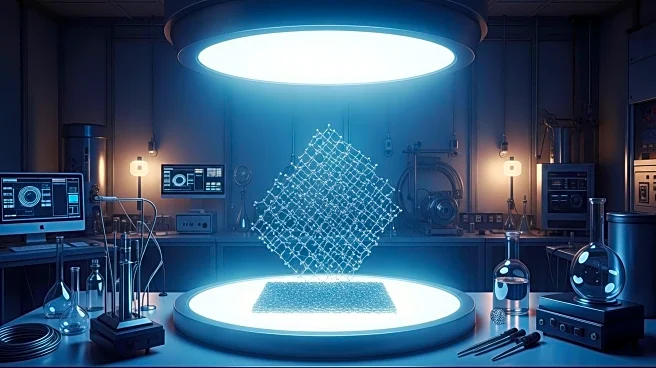What's Happening?
First Graphene, an advanced materials company, is actively exploring the potential of graphene to transform industries by replacing expensive additives. Eve Sigley, the Commercial Manager at First Graphene, discussed
the multifunctional properties of graphene at the K Show in Düsseldorf. Graphene is known for enhancing strength, wear resistance, and product lifespan, making it a viable alternative to traditional materials. The company aims to leverage graphene's capabilities across various sectors, including thermoplastics, cement, and protective coatings. This innovation is positioned as a greener alternative to halogenated flame retardants, offering both performance and sustainability benefits.
Why It's Important?
The exploration of graphene as a replacement for costly additives is significant for multiple industries, including construction, mining, and manufacturing. Graphene's ability to enhance product durability and sustainability could lead to reduced costs and environmental impact. Industries that adopt graphene-based solutions may benefit from improved product performance and longer lifespans, potentially leading to increased competitiveness and market share. The shift towards sustainable materials like graphene aligns with global trends in reducing reliance on environmentally harmful substances, thus contributing to broader environmental goals.
What's Next?
First Graphene's ongoing research and development efforts are likely to focus on expanding the applications of graphene across more industries. As the company continues to unlock graphene's potential, stakeholders in manufacturing and construction may begin to integrate these advanced materials into their processes. This could lead to collaborations with other companies seeking sustainable solutions, as well as potential regulatory changes to accommodate new materials. The success of these initiatives may drive further investment in graphene technology and innovation.
Beyond the Headlines
The adoption of graphene in various industries could have long-term implications for material science and sustainability. As companies move towards greener alternatives, there may be ethical considerations regarding the sourcing and production of graphene. Additionally, the widespread use of graphene could influence cultural perceptions of sustainability and innovation, encouraging more industries to prioritize environmentally friendly practices.










